Who can defend in court?
In today's legal society, the issue of protecting the rights and interests of citizens in legal proceedings is becoming more and more relevant. Who can represent the interests of a person in court and defend him? This issue requires detailed consideration and analysis.
According to the current legislation of Ukraine, the protection of a person's interests in court can be carried out in several ways:
1. Self-representation
Every person has the right to independently represent his interests in court. This right is enshrined in the Constitution of Ukraine and procedural codes. However, it should be noted that self-representation can be effective only if the person has a sufficient level of legal knowledge and skills.
2. Representation by a lawyer
The most common and effective form of protection in court is representation by a professional lawyer. A lawyer is a specialist in the field of law who has the right to practice law on the basis of a certificate of the right to practice law.
A lawyer can take various actions to protect the client's interests, including:
- Conduct a legal analysis of the client's situation
- Provide a legal opinion on the situation
- Prepare a legal opinion or a lawyer's opinion
- Prepare and submit a lawyer's request
- Provide written legal advice
- Represent the client's interests in court
It is important to note that a lawyer has the exclusive right to represent in higher courts such as the Supreme Court.
3. Representation by another person
In some categories of cases, the law allows the representation of a person's interests by other persons who are not lawyers. These can be:
- Close relatives or family members
- Representatives of state authorities or local self-government
- Representatives of legal entities
However, it should be noted that such persons have limited opportunities for representation compared to lawyers.
Advantages of professional legal protection
Regardless of who is defending in court, it is important to understand the benefits of professional legal support. Let's consider some key aspects:
1. Legal analysis of the situation
A professional lawyer or attorney is able to conduct an in-depth analysis of the client's situation, taking into account all legal nuances and possible consequences. Such an analysis of the situation by a lawyer or an analysis of the situation by a lawyer allows you to identify the strengths and weaknesses of the case, to develop an effective defense strategy.
2. Legal opinion
Based on the analysis, the specialist can prepare a well-founded legal opinion. This document contains an assessment of the legal situation, an analysis of the applicable legislation and recommendations for further action. A legal opinion can be an important tool in building a line of defense in court.
3. Lawyer request
A lawyer has the right to submit legal requests to various bodies and institutions to obtain the necessary information. Writing a lawyer's request is an important stage in the collection of evidence and preparation for the court process. Information obtained through a lawyer's request can become a key element in a case.
4. Written legal advice
A professional lawyer can provide a client with written legal advice or written legal advice. Such a document contains a detailed analysis of the legal situation, an explanation of the client's rights and obligations, as well as recommendations on possible actions. Written legal advice is an important tool for the client, which allows him to better understand his legal position and make informed decisions.
5. Online consultations
In today's world, online consultations are gaining more and more popularity. Legal consultation online or online consultation of a lawyer allows the client to receive professional advice without leaving home. This is especially true during a pandemic or for people with disabilities. Online legal advice can be the first step in solving a legal problem.
Choosing a defender: what to pay attention to
When choosing a person who will defend in court, it is important to consider the following factors:
1. Qualifications and experience
Check the qualifications and experience of the defense attorney in the relevant field of law. An experienced specialist will be able to more effectively conduct a legal analysis of the situation and prepare a well-founded legal opinion.
2. Specialization
Different lawyers and attorneys may specialize in different areas of law. Choose a specialist who has work experience in your field.
3. Reputation
Pay attention to the reputation of the defender. Customer reviews, recommendations of colleagues and professional achievements can say a lot about the quality of services provided by a specialist.
4. Communication
It is important that there is effective communication between you and your attorney. A lawyer's or attorney's ability to clearly explain complex legal concepts and keep you regularly updated on the progress of the case is critical.
5. Cost of services
Discuss the cost of services in advance. Remember that the cheapest option is not always the best, but excessively high prices do not guarantee success either.
Defense in court is a complex process that requires deep knowledge of legislation, analethical skills and practical experience. Although the law allows various forms of representation in court, professional legal representation has significant advantages.
A lawyer or qualified lawyer can conduct an in-depth legal analysis of the situation, prepare a reasoned legal opinion, use the attorney request tool to gather evidence, provide written legal consultation, and effectively represent the client's interests in court.
When choosing a defense attorney, it is important to consider his qualifications, experience, specialization, and reputation. The right choice of a defense attorney can be a key factor in achieving a positive outcome in a lawsuit.
Regardless of whether you decide to use the services of a professional attorney or represent your interests yourself, remember that knowing your rights and understanding the legal process is an important component of a successful defense in court.




































